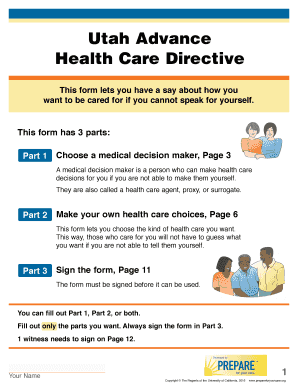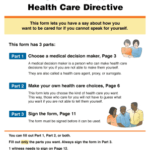A Utah Advance Health Care Directive, otherwise known as the “Advance Directive,” is designed to express your health wishes when you cannot speak for yourself. It explains your treatment preferences to medical providers in advance of an illness or injury. The Advance Health Care Directive replaces the functions of a Health Care Power of Attorney and a Living Will. Through this document, you’ll appoint an Agent and, if the initial Agent is unavailable or unwilling to serve in the moment of need, a successor Agent who will speak on your behalf when you are either temporarily incapacitated and cannot speak for yourself or when you are facing end-of-life situations.
Because the document was created and approved by the Utah state legislature and signed into law as Utah Code § 75-2a-117, the Advance Directive is a document that cannot be ignored by a health care professional except in emergency situations. Thus, your wishes must supersede those of your doctor.
You Can Be General or Specific in Your Instructions
You can be general or specific about your wishes in the Advance Directive. You are the principal in this legal arrangement who can call the shots. Here are some examples of permissions you can give:
- Enable your Agent to obtain copies of your medical records at any time, even when you can speak for yourself, or you can limit your Agent’s authority to moments of your incapacity.
- Enable your Agent to admit you to a licensed health care facility for long-term placement other than convalescent or recuperative care, or limit that authority.
- You can consent to participate in medical research, be an organ donor or reject those options.
- In the Advance Directive, you can nominate a guardian for you if it appears your situation will be long term and a guardianship for an adult proceeding appears necessary.
In your Advance Directive you will have the option to be specific about your end-of-life wishes. You can specify limits on when your health care provider or Agent may withhold or withdraw life-sustaining care. You can place no limits on your health care provider’s ability to do so. You can defer to the judgment of your Agent wholly or in part or you can elect not to appoint an Agent for your end-of-life wishes and essentially allow your medical providers to determine what is best.
Choosing Your Agent
You’ll want to choose an Agent who knows you well and respects your wishes. It is preferable you select an Agent who is local and who can be readily available. Although you may select co-Agents, their decisions must always be uniform; for this reason, having co-Agents is not ideal. If you wish that more than one member of your immediate family to be consulted, you may include language in your Advance Directive essentially stating that the Agent should consult with or inform available immediate family members about the situation you are facing, particularly situations concerning withholding or withdrawal of treatment. This approach may help both the Agent and you to feel that the best thinking is being done for your health care under the circumstances. Encouraging such communication relieves some of the emotional pressure your Agent may be feeling when making life or death decisions on your behalf.
Additional Instructions for Your Agent
The Advance Directive is fairly open ended. You can provide additional direction to your Agent in your Advance Directive. Below are some examples of additional directions commonly included:
- Require your Agent to consult a particular medical professional for as long as possible
- Require your Agent to obtain a referral for quality specialists from trusted sources if your primary care physician is unable to provide medical treatment.
- Require your Agent to seek treatment for you with a specialist in the area of your medical condition, whenever economically feasible.
- Require your Agent to obtain second opinions from appropriate specialists, if economically feasible, before authorizing or not authorizing any tests which your attending physician believes would be beneficial in restoring your health.
- Require your Agent to consult religious clergy in making end-of-life decisions.
When making specifications, it is wise to keep in mind that your Agent may be facing a variety of unforeseen circumstances; thus, being overly restrictive may cause more harm than good. With too much specific direction, you may end up preventing your Agent from adapting to those unforeseen circumstances as needed.
A quality estate planning attorney can help you navigate this form and help you add language that is well measured to express your wishes while enabling your Agent the flexibility needed to adapt to a variety of situations. To understand further how such a document might benefit you specifically, give us a call.





